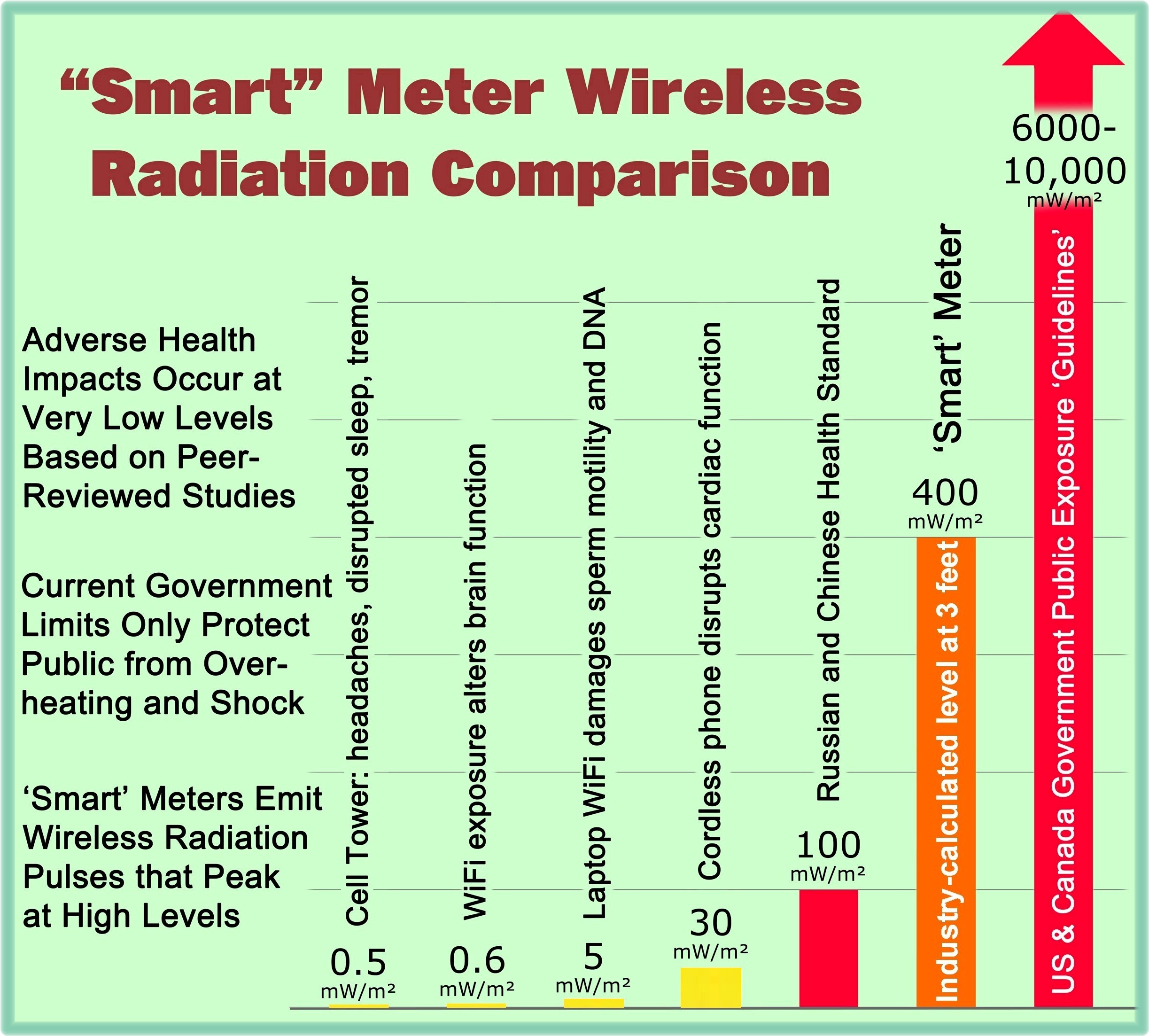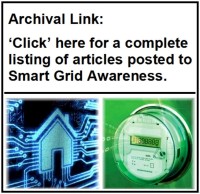 As electric utilities in Hawaii continue to deploy smart meters across the islands of the nation’s 50th state, a legislative house resolution was introduced on March 7, 2014, “expressing support of an immediate moratorium on the installation and promotion of smart meters until they are proven safe to the public health and the environment, economy, and security of the state.”
As electric utilities in Hawaii continue to deploy smart meters across the islands of the nation’s 50th state, a legislative house resolution was introduced on March 7, 2014, “expressing support of an immediate moratorium on the installation and promotion of smart meters until they are proven safe to the public health and the environment, economy, and security of the state.”
The offered house resolution (HR146) was referred to three separate house committees for consideration on March 12th.
Two important points need to be made:
- The house resolution makes a strong case against smart meters; and
- The house resolution will likely only be passed if there is strong public support for the measure.
Particularly the citizens of Hawaii need to voice their support for the measure, and people in other states and provinces need to consider similar measures.
What follows is the legislative language for the house resolution:
HOUSE RESOLUTION expressing support for an immediate moratorium on THE INSTALLATION AND PROMOTION OF smart meters UNTIL THEY are proven safe to public health and the environment, economy, and security of the state.
WHEREAS, certain jurisdictions in Hawaii and elsewhere are transitioning to the use of smart meters, which are devices that track and record details of customers’ energy usage and automatically transmit the information to the utility provider by wireless frequencies; and
WHEREAS, smart meters are an integral part of a smart grid and have started to replace analog meters that are read manually on a monthly basis by local meter readers; and
WHEREAS, the American Academy of Environmental Medicine in a letter to the California Utilities Commission called for an immediate moratorium on smart meter installation and later restated its call for a moratorium based on new scientific evidence demonstrating the correlation between smart meter emissions and adverse health effects; and
WHEREAS, many research studies show adverse biological effects from pulsed microwave frequency radiation, such as that emitted by smart meters, at exposure levels far below the Federal Communications Commission limits; and
WHEREAS, the Federal Communications Commission guidelines are substantially outdated since they are based on research that dates back to 1986, well before the proliferation of cell phone and WiFi use, and based on data related to limited exposure for adult men, but not pervasive and ongoing exposure or exposure for women and children; and
WHEREAS, studies have shown damage from this type of radiation to the environment resulting in biological effects in plants, trees, animals, and insects, including birth defects and fertility problems in cattle; and
WHEREAS, radio/microwave frequencies are not confined to specific households or buildings, but rather affect any objects or people in their path, as they pass through most known substances, exposing any person in the area to radiation without consent; and
WHEREAS, the Radiofrequency Interagency Work Group identified 14 deficiencies in the Institute of Electrical and Electronics Engineers radio frequency standard in 1999, and the standard has not been brought up to date; and
WHEREAS, the Health Officer of Santa Cruz County in a memorandum to the Santa Cruz County Board of Supervisors on health risks associated with smart meters noted, “there is no scientific data to determine if there is a safe radio frequency exposure level regarding its non-thermal effects”; and:
WHEREAS, countries, including China, Russia, and most of Europe, have significantly lower exposure standards than the United States; and
WHEREAS, the World Health Organization has categorized radio/microwave frequency radiation, such as that emitted by smart meters, as a Class 2B potential carcinogen and, should it upgrade this type of radiation to Class 2A, all existing smart meters will have to be replaced; and
WHEREAS, in January of 2014, Northeast Utilities, New England’s largest utility system, with almost 4,000,000 customers, indicated in a statement to the Massachusetts Department of Public Utilities that advanced metering infrastructure is costly for consumers and that there are other grid modernization technologies and strategies that are more cost effective; and
WHEREAS, some consumers who have transitioned to the use of smart meters have experienced an increase in their utility bills and inaccurate billing and have consequently pursued litigation due to sky-rocketing electricity bills; and
WHEREAS, contrary to promotional advertising, studies show smart meter mesh networks are energy-demanding, consuming significant amounts of electricity and will not lead to greener or more sustainable energy; and
WHEREAS, fires from smart meters have been reported from around the world, including the United States; and
WHEREAS, smart meters may not be as cost effective as once thought when considering the costs of fires started by smart meters, treating unforeseen health issues, mitigating cyber attacks, implementing security precautions, and addressing potential lawsuits; and
WHEREAS, smart meters relay previously undisclosed data reflecting power usage without adequately protecting this potentially sensitive information; accordingly, this data may be accessed by unauthorized persons or entities and could result in an intrusion into customers’ privacy rights and security interests; and
WHEREAS, utility companies have been shown to mine and sell smart data to corporations and to share it with government agencies; and
WHEREAS, the American Civil Liberties Union of Hawaii has condemned the lack of consumer privacy of smart meters that track the ebb and flow of water, gas, and electricity due to the disclosure of detailed information about private life, including energy usage data measured moment to moment, that allows the reconstruction of a household’s activities; and
WHEREAS, concerns pertaining to the vulnerability of smart grid technology to hacking and cyber terrorism have been raised by some security officials and industry experts, particularly related to making energy systems accessible on the Internet through public IP addresses that may allow smart meters to be turned off remotely, thereby halting energy supply; and
WHEREAS, there are a number of jurisdictions throughout the United States, representing millions of people, that are opposed to mandatory smart meters, and some of these have made smart meter installation illegal; and
WHEREAS, as part of an ongoing Integrated Resource Planning process, the Public Utilities Commission has requested that Hawaiian Electric Company investigate the adoption and utilization of a smart grid, including smart meters, to facilitate energy distribution statewide by Hawaiian Electric Company and its subsidiaries; and
WHEREAS, a citizen petition calling for the halt to smart meter installation and smart grid technologies in Hawaii has over 1,000 signatures; now, therefore,
BE IT RESOLVED by the House of Representatives of the Twenty-seventh Legislature of the State of Hawaii, Regular Session of 2014, that this body supports an immediate moratorium on the installation and promotion of smart meters by state agencies and organizations receiving state funding until smart meters are proven safe to public health and the environment, economy, and security of the State; and
BE IT FURTHER RESOLVED that the Department of Health is requested to investigate the impact of smart meters on public health and to submit a report of its findings and recommendations to the Legislature no later than 20 days prior to the convening of the Regular Session of 2015; and
BE IT FURTHER RESOLVED that certified copies of this Resolution be transmitted to the Director of Health and Chairperson of the Public Utilities Commission, who is requested to forward a copy to the Chief Executive Officers of each electric utility in the State.
For a link to view the entire house resolution at the state government website, click here: http://www.capitol.hawaii.gov/session2014/bills/HR146_.HTM.
In addition, to sign a petition for Hawaii to “Stop the proposed ‘smart grid’ and its contaminating electro-pollution in our homes and in the ocean,” refer to the following link: http://petitions.moveon.org/sign/stop-smart-grid-electro?source=c.fwd&r_by=3159788.




